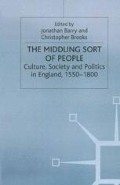Abstract
Few historical essays can have had a more enduring effect than Jack Hexter’s article attacking ‘the myth of the Tudor middle class’.1 Though literary critics, politicians and students have continued to see early modern England in terms of the rise of the middle class, few professional historians have dared to do so; indeed, the issue has hardly seemed worthy of discussion. With a few exceptions, even Marxist historians have adopted alternative social classifications, playing down the importance of middle-class or bourgeois groups during this period.2 Meanwhile, the attention of historians has focused elsewhere. The great storm over the gentry in the 1950s and 1960s was succeeded by an emphasis on ‘history from below’, concentrating on the lower classes and ‘popular culture’. This has in turn given way to renewed concern with the gentry, even the aristocracy.
Preview
Unable to display preview. Download preview PDF.
Editor information
Copyright information
© 1994 Macmillan Publishers Limited
About this chapter
Cite this chapter
Barry, J. (1994). Introduction. In: Barry, J., Brooks, C. (eds) The Middling Sort of People. Themes in Focus. Palgrave, London. https://doi.org/10.1007/978-1-349-23656-5_1
Download citation
DOI: https://doi.org/10.1007/978-1-349-23656-5_1
Publisher Name: Palgrave, London
Print ISBN: 978-0-333-54063-3
Online ISBN: 978-1-349-23656-5
eBook Packages: Palgrave History CollectionHistory (R0)

